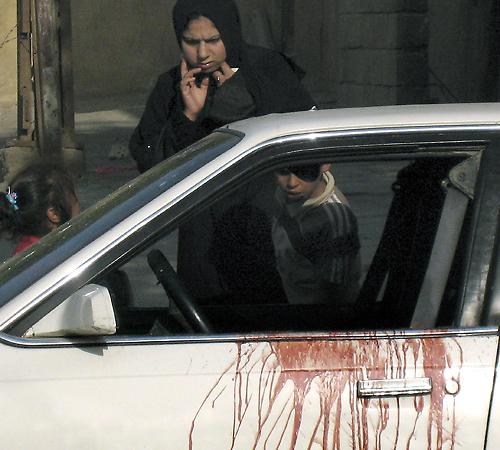Australian guards murder Iraqi women aboard car approaching their convoy

A woman and a child inspect a car with blood splattered on the door after two Christian Iraqi women were shot to death in central Karradah, Baghdad, Iraq, on Tuesday, Oct. 9, 2007. Iraqi police, and witnesses said that the men who shot them were in a conv THE ASSOCIATED PRESS
October 10, 2007
BAGHDAD — Guards working for an Australian-owned security company fired on a car as it approached their convoy Tuesday, killing two women before speeding away from the latest bloodshed blamed on the deadly mix of heavily armed protection details on Baghdad’s crowded streets.
The deaths of the two Iraqi Christians – including one who used the white sedan as an unofficial taxi to raise money for her family – came a day after the Iraqi government handed U.S. officials a report demanding hefty payments and the ouster from Iraq of embattled Blackwater USA for a chaotic shooting last month that left at least 17 civilians dead.
The deaths Tuesday at a Baghdad intersection may sharpen demands to curb the expanding array of security firms in Iraq watching over diplomats, aid groups and others.
“We deeply regret this incident,” said a statement from Michael Priddin, the chief operating officer of Unity Resources Group, a security company owned by Australian partners but with headquarters in Dubai in the United Arab Emirates.
Priddin said the company would disclose more details of the shooting after “the facts have been verified and the necessary people and authorities notified.” Priddin would not comment on whether his guards killed the women.
Get The Daily Illini in your inbox!
But initial accounts – from company statements, witnesses and others – suggested the guards opened fire as the car failed to heed warnings to stop and drifted closer to the convoy near a Unity facility in central Baghdad’s Karrahah district.
It was not immediately clear whether the guards were protecting a client at the time, but a group that uses its security agents said its personnel were not at the scene.
Four armored SUVs – three white and one gray – were about 100 yards from an main intersection in the Shiite-controlled district. As the car, a white Oldsmobile, moved into the crossroads, the Unity guards threw a smoke bomb in an apparent bid to warn the car not to come closer, said Riyadh Majid, an Iraqi policeman who saw the shooting.
Two of the Unity guards then opened fire. The woman driving the car tried to stop, but was killed along with her passenger. Two of three people in the back seat were wounded.
Priddin’s statement offers a similar account: “The first information that we have is that our security team was approached at speed by a vehicle which failed to stop despite an escalation of warnings which included hand signals and a signal flare. Finally shots were fired at the vehicle and it stopped.”
Investigators said they collected 19 spent 5.56mm shell casings, ammunition commonly used by U.S. and NATO forces and most Western security organizations. The pavement was stained with blood and covered with shattered glass from the car windows.
Majid said the convoy raced away after the shooting. Iraqi police came to collect the bodies and tow the car to the local station.
A third policeman, who spoke on condition of anonymity because he feared retribution, said the guards were masked and wearing khaki uniforms. He said one of them left the vehicle and started to shoot at the car while another opened fire from the open back door of a separate SUV.
The victims were identified by relatives and police as Marou Awanis, born in 1959, and Geneva Jalal, born in 1977. Awanis’ sister-in-law, Anahet Bougous, said the woman had been using her car to drive government employees to work to help raise money for her three daughters. Her husband died during heart surgery last year.
Associated Press writers Katarina Kratovac, Sameer N. Yacoub and Qassim Abdul-Zahra contributed to this report






